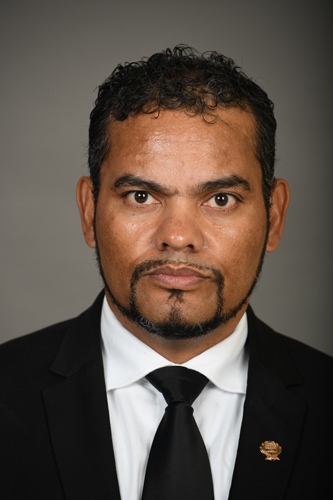1. How did you come to join your political party and become an MP?
My grandfather was a farm-worker, and upon reaching old age, he together with my grandmother and ten children was forcibly removed from the farm; after he dedicated his entire life to the farm-owner. This informed my conviction on social justice, and informed my decision to join the ANC, and participated as early as 1989 in student protest and community uprising.
After having graduated from Pentech (CPUT), I was mandated by then Secretary-General, Comrade Kgalema Motlanthe to be deployed full time to the African National Congress (Northern Cape), as Provincial Head of Policy, Research and Analysis. After having served for a decade, and was re-assign in 2009, as a public representative (MPL), and deployed as MEC for Social Development and Cooperative Governance and Traditional Affairs. I was further re-deployed as a Member of Parliament in 2018.
2. What is one goal that you would like to achieve during your time as an MP?
Realizing international solidarity with the oppressed and vulnerable in Africa, and in the broader developing South.
3. What does your job as an MP entail, and what do you find challenging/demanding?
Currently I am serving as a Member of the Executive and Deputy Minister of International Relations and Cooperation. The role of an Executive Member often does not allow one to attend all meetings of committees and other parliamentary duties which could become difficult to navigate given the loaded schedule
4. Which constituency office have you been assigned to? Can you give examples of constituency work you engage in?
George PCO in the Southern Cape has been assignment. The office mainly manages social development (SASSA) queries, health services, local government concerns, gender violence and unemployment assistance matters. Annually I partner with Heads of Missions (diplomats) resident in South Africa and engage in Public Diplomacy, where we serve as an interface between a particular embassy and the local community.
5. How do you think Parliament can drive more public participation in policy, legislation and voting?
Parliament in my view has become more vigilant and proactive in public awareness and has become more vibrant in making the public aware of parliamentary activities. Parliament should however be more active in making the public aware of legislation and policy in rural areas by investing in equipping constituency offices with government material, etc. In addition, more concerted efforts should be made to ensure that there is enhanced Public Participation during every parliamentary sitting.
6. What are you passionate about, both professionally and personally?
Professionally my aim is to ensure that we as public representatives serves our country with dignity and tireless efforts to alleviate poverty, unemployment and inequality. I would want to be regarded as a moral reference of a cadre. I substantively value my wife and kids.
7. Which social justice issues are you most concerned with?
Inequality and poverty; wherein the rich grow richer and the poorer becomes poorer. This divide should be worrisome to any social justice proponent.
8. Does Parliament do a good job of holding the Executive to account? If not, what can be done to improve this?
Parliament do hold the executive accountable through ‘Questions to the Executive’, amongst others. Section 92 amongst others provide in sub section
(2) that Members of the Cabinet are accountable collectively and individually to Parliament for the exercise of their powers and the performance of their functions; and sub section (3) cement the fact that Members of the Cabinet must provide Parliament with full and regular reports concerning matters under their control.
9. What are your or your party's aspirations/plans for the remainder of the Sixth Parliament?
To implement the Economic Recovery Reconstruction Plan, after our country has experience a protracted period under the COVID-19 pandemic. The Presidential Employment Stimulus programmed has reached 960 972 beneficiaries, of whom 84% are Youth and 58% Female. In addition, continue to implement the comprehensive social protection amounting to more than R276 billion.
10. What obstacles prevent Parliament from doing its work and how would you fix it?
Currently the unfortunate lack of infrastructure has made it difficult to connect with Members of Parliament but in my view, Parliament has managed to navigate smartly around the situation it finds itself in, using virtual mechanisms of communication.


Comments
Keep comments free of racism, sexism, homophobia and abusive language. People's Assembly reserves the right to delete and edit comments
(For newest comments first please choose 'Newest' from the 'Sort by' dropdown below.)